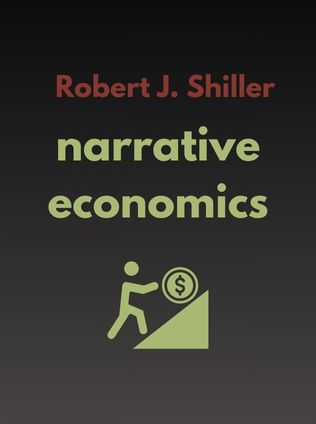
Narrative Economics
How Stories Go Viral and Drive Major Economic Events
By Robert J. Shiller
Published 10/2019
About the Author
Robert J. Shiller is a distinguished economist and professor of economics at Yale University, renowned for his work on financial markets and behavioral economics. Shiller was awarded the Nobel Prize in Economic Sciences in 2013, alongside Eugene Fama and Lars Peter Hansen, for his empirical analysis of asset prices. His research has profoundly influenced how economists understand market volatility, bubbles, and investor psychology.
Shiller is also known for his ability to communicate complex economic concepts to a broader audience. He has authored several influential books, including Irrational Exuberance, which accurately predicted the dot-com bubble, and Finance and the Good Society. His work often challenges traditional economic theories by emphasizing the importance of psychology and human behavior in economic decision-making.
Main Idea
In Narrative Economics, Robert J. Shiller explores a revolutionary concept: the idea that narratives, or the stories people tell and believe, play a fundamental role in shaping economic outcomes. Shiller argues that while traditional economics focuses heavily on data, statistics, and models, it often overlooks the powerful influence of these narratives on economic behavior. Economic events such as financial crises, stock market bubbles, and recessions are not just the result of objective economic factors; they are deeply intertwined with the stories people construct to make sense of these events.
Shiller’s thesis is that narratives spread like viruses—they are contagious and can shape the collective behavior of societies. By understanding how these narratives emerge, evolve, and influence economic decisions, economists can gain a more holistic view of the forces that drive economic cycles. Shiller advocates for incorporating qualitative research into economics to better capture the human element that traditional models often miss.
Table of Contents
- The Power of Narratives in Economics
- Factors That Influence the Spread of Economic Narratives
- Recurring Economic Narratives in History
- The Role of Technology in Narrative Economics
- Implications for Future Economic Policy
- Conclusion
The Power of Narratives in Economics
Shiller begins by asserting that narratives are extraordinarily powerful because they help people make sense of the world around them. By organizing random events and observations into coherent stories with clear narrative arcs, individuals come to understand their world, how it came to be, and their place within it. In economics, these narratives often explain why certain events occur, who is to blame, and what the future might hold.
According to Shiller, economic events—unlike natural phenomena such as weather patterns—are the result of human beliefs and actions. This makes economics uniquely susceptible to the influence of narratives. For instance, the Great Depression of the 1930s was not just a severe economic downturn; it was also shaped by the pervasive narrative of despair and loss of confidence that spread through society. As Shiller notes, "The narratives that people believe shape their economic decisions, and those decisions, in turn, shape the economy" (Shiller).
One striking example of the power of narratives is the concept of "irrational exuberance," a term Shiller himself coined in the 1990s to describe the unsustainable enthusiasm that often drives asset bubbles. This narrative, which took hold during the dot-com bubble, led investors to pour money into technology stocks, driving prices to unsustainable levels. When the bubble burst, the narrative quickly shifted to one of fear and pessimism, leading to a massive sell-off and a market crash.
Factors That Influence the Spread of Economic Narratives
Shiller identifies several key factors that contribute to the widespread dissemination of economic narratives. These factors help explain why some stories gain traction and influence behavior, while others fade away.
Sign up for FREE and get access to 1,400+ books summaries.
You May Also Like
The Subtle Art of Not Giving a F*ck
A Counterintuitive Approach to Living a Good Life
By Mark MansonRich Dad Poor Dad
What the Rich Teach Their Kids About Money - That the Poor and Middle Class Do Not!
By Robert T. KiyosakiHow To Win Friends and Influence People
The All-Time Classic Manual Of People Skills
By Dale CarnegieFreakonomics
A Rogue Economist Explores the Hidden Side of Everything
By Steven D. Levitt and Stephen J. DubnerQuiet: The Power of Introverts
The Power of Introverts in a World That Can't Stop Talking
By Susan Cain



















